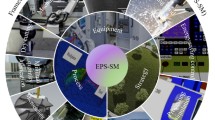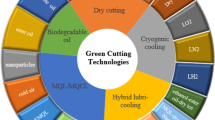Abstract
Non-traditional mechanizing methods aid the traditional mechanizing methods and are in the successful development meant and used in most areas, especially in aerospace industries. However, there are some drawbacks, and these processes have some major sustainability issues which are not suitable for the environment and future energy resources. The primary sustainability issues faced in non-conventional machining are: It produces hazardous and toxic gases and is environmentally not good for the worker’s health. Production of electromagnetic waves along with environmental pollutants extensively produces heat and spark in some cases. Production of decomposed material and bulky metal wastes in massive amounts will lead to its collection. High consumption of electricity makes the process less efficient and also non-sustainable. This paper is oriented to recognize the sustainability issues faced in the non-conventional machining processes in-depth and provide a theoretical approach for the solution model, which can be further designed experimentally as an extension to this. This paper aims to overcome the issues mentioned above one by one and provide a single solution model targeting all the common problems faced, which can be adopted quickly without any significant replacements to the existing systems.
Access this chapter
Tax calculation will be finalised at checkout
Purchases are for personal use only
Similar content being viewed by others
References
Pušavec, F., & Kopac, J. (2009). Achieving and implementation of sustainability principles in machining processes. Advances in Production Engineering & Management, 4, 151–160.
Envirowise, GG 446. (2004) Sustainable manufacturing: A signposting guide for metal machining companies. Project documentation, www.envirowise.gov.uk.
Balic, J., Cus, F. (2007). Intelligent modelling in manufacturing. Journal of Achievements in Materials and Manufacturing Engineering, 24(1), s.340–349, 340–348
Zuperl, U., & Cus, F. (2008). Machining process optimization by colony based cooperative search technique. Strojniski Vestnik, 54, 751–758.
Kopac, J., & Pušavec, F. (2009). Concepts of sustainable machining processes.
Davim, J. (2013). Nontraditional machining processes. Springer, London. https://springer.longhoe.net/book/10.1007%2F978-1-4471-5179-1
El-Hofy, H., & Youssef, H. (2009). Environmental hazards of nontraditional machining. In Proceedings of the 4th IASME/WSEAS International Conference on Energy & Environment (EE'09). World Scientific and Engineering Academy and Society (WSEAS), Stevens Point, Wisconsin, USA, pp. 140–145
Gamage, J. R., & DeSilva, A. K. M. (2015). Assessment of research needs for sustainability of unconventional machining processes. Procedia CIRP, 26, 385–390. https://doi.org/10.1016/j.procir.2014.07.096
El-Hofy, H., & Youssef, H. (2009). Environmental hazards of nontraditional machining, pp. 140–145.
Gupta, K., & Gupta, M. K. (2018). Developments in nonconventional machining for sustainable production: A state-of-the-art review. Proceedings of the Institution of Mechanical Engineers, Part C: Journal of Mechanical Engineering Science, 233(12), 4213–4232. https://doi.org/10.1177/0954406218811982
Jain, A., Kansal, H. (2017). Green machining—machining of the future. In 4th National Conference on Advancements in Simulation & Experimental Techniques in Mechanical Engineering (NCASEme-2017)
Dhakar, K., & Dvivedi, A. (2015). Parametric evaluation on near-dry electric discharge machining. Materials and Manufacturing Processes, 31(4), 413–421. https://doi.org/10.1080/10426914.2015.1037905
Khanna, N., Agrawal, C. (2019). Titanium machining using indigenously developed sustainable cryogenic machining facility. In Materials Forming, Machining and Tribology (pp. 183–205). Springer International Publishing. https://doi.org/10.1007/978-3-030-18854-2_8
Gholipoor, A., Baseri, H., Shakeri, M., & Shabgard, M. (2014). Investigation of the effects of magnetic field on near-dry electrical discharge machining performance. Proceedings of the Institution of Mechanical Engineers, Part B: Journal of Engineering Manufacture, 230(4), 744–751. https://doi.org/10.1177/0954405414558737
Tang, L., & Du, Y. T. (2013). Experimental study on green electrical discharge machining in tap water of Ti–6Al–4V and parameters optimization. The International Journal of Advanced Manufacturing Technology, 70(1–4), 469–475. https://doi.org/10.1007/s00170-013-5274-5
Valaki, J. B., & Rathod, P. P. (2015). Assessment of operational feasibility of waste vegetable oil based bio-dielectric fluid for sustainable electric discharge machining (EDM). The International Journal of Advanced Manufacturing Technology, 87(5–8), 1509–1518. https://doi.org/10.1007/s00170-015-7169-0
Ng, P. S., Kong, S. A., & Yeo, S. H. (2016). Investigation of biodiesel dielectric in sustainable electrical discharge machining. The International Journal of Advanced Manufacturing Technology, 90(9–12), 2549–2556. https://doi.org/10.1007/s00170-016-9572-6
Mishra, B. P., & Routara, B. C. (2020). Evaluation of technical feasibility and environmental impact of Calophyllum Inophyllum (Polanga) oil based bio-dielectric fluid for green EDM. Measurement, 159, 107744. https://doi.org/10.1016/j.measurement.2020.107744
Yang, Y., Natsu, W., & Zhao, W. (2011). Realization of eco-friendly electrochemical micromachining using mineral water as an electrolyte. Precision Engineering, 35(2), 204–213. https://doi.org/10.1016/j.precisioneng.2010.09.009
Ryu, S. (2015). Eco-friendly ECM in citric acid electrolyte with microwire and microfoil electrodes. International Journal of Precision Engineering and Manufacturing, 16(2), 233–239. https://doi.org/10.1007/s12541-015-0031-3
Guodong, L., Yong, L., Quancun, K., & Hao, T. (2016). Selection and optimization of electrolyte for micro electrochemical machining on stainless steel 304. Procedia CIRP, 42, 412–417. https://doi.org/10.1016/j.procir.2016.02.223
Li, Z., Fuhr, O., Fichtner, M., & Zhao-Karger, Z. (2019). Towards stable and efficient electrolytes for room-temperature rechargeable calcium batteries. Energy & Environmental Science, 12(12), 3496–3501. https://doi.org/10.1039/c9ee01699f
Imam, S. H., & Canyon, A. (2011). U.S. Patent No. US 8,008,242 B1. Washington, DC: U.S. Patent and Trademark Office. https://patents.google.com/patent/US8008242B1/en#patentCitations
Hughes, P., & Ferrett, E. (2011). Introduction to health and safety at work. Oxford: Butterworth-Heinemann.
Rajurkar, K. P., Hadidi, H., Pariti, J., & Reddy, G. C. (2017). Review of sustainability issues in non-traditional machining processes. Procedia Manufacturing, 7, 714–720. https://doi.org/10.1016/j.promfg.2016.12.106
Jawahir, I. S., & Dillon, Jr., O. W. (2007). Sustainable manufacturing processes: New challenges for develo** predictive models and optimization techniques. In Proceedings of First International Conference on Sustainable Manufacturing, pp. 1–19
Jaafar, I., Venkatachalam, A., Joshi, K., Ungureanu, A., Silva, N., Rouch, K., Dillon, O., & Jawahir, I.S. (2007). Product design for sustainability: A new assessment methodology and case studies. https://doi.org/10.1002/9780470168202.ch2
Author information
Authors and Affiliations
Corresponding author
Editor information
Editors and Affiliations
Rights and permissions
Copyright information
© 2021 The Author(s), under exclusive license to Springer Nature Singapore Pte Ltd.
About this paper
Cite this paper
Kiran, Tomar, H., Gupta, N. (2021). Sustainability Concerns of Non-conventional Machining Processes—An Exhaustive Review. In: Agrawal, R., Jain, J.K., Yadav, V.S., Manupati, V.K., Varela, L. (eds) Recent Advances in Smart Manufacturing and Materials. Lecture Notes in Mechanical Engineering. Springer, Singapore. https://doi.org/10.1007/978-981-16-3033-0_25
Download citation
DOI: https://doi.org/10.1007/978-981-16-3033-0_25
Published:
Publisher Name: Springer, Singapore
Print ISBN: 978-981-16-3032-3
Online ISBN: 978-981-16-3033-0
eBook Packages: EngineeringEngineering (R0)




